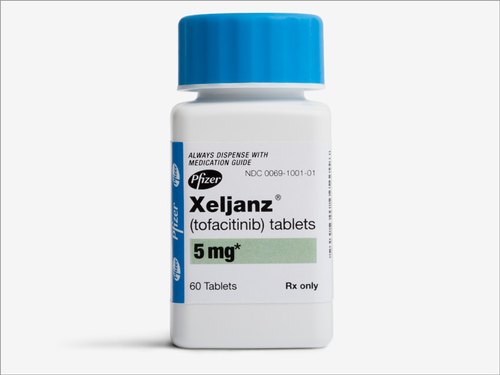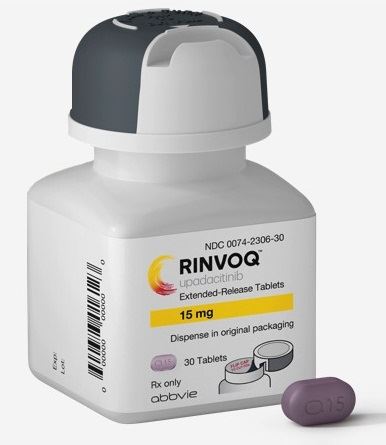Xeljanz (tofacitinib) vs Rinvoq (upadacitinib)
Xeljanz (tofacitinib) vs Rinvoq (upadacitinib)
Xeljanz (tofacitinib) and Rinvoq (upadacitinib) are both Janus kinase (JAK) inhibitors used to treat autoimmune conditions such as rheumatoid arthritis, but they target different subtypes of the JAK enzyme, which may influence their effectiveness and side-effect profiles. Xeljanz has been on the market longer and has a broader range of approved indications, including ulcerative colitis, while Rinvoq is a newer medication with a more selective action on JAK1, which could potentially result in fewer side effects. When deciding between the two, it is important to consider individual patient factors such as disease severity, response to previous treatments, potential side effects, and any other health conditions that could be affected by the choice of medication.
Difference between Xeljanz and Rinvoq
| Metric | Xeljanz (tofacitinib) | Rinvoq (upadacitinib) |
|---|---|---|
| Generic name | Tofacitinib | Upadacitinib |
| Indications | Rheumatoid arthritis, psoriatic arthritis, ulcerative colitis | Rheumatoid arthritis, psoriatic arthritis, atopic dermatitis |
| Mechanism of action | Janus kinase (JAK) inhibitor | Janus kinase (JAK) inhibitor |
| Brand names | Xeljanz, Xeljanz XR | Rinvoq |
| Administrative route | Oral | Oral |
| Side effects | Upper respiratory tract infections, headache, diarrhea, and nasal congestion | Upper respiratory tract infections, nausea, cough, and fever |
| Contraindications | Severe liver disease, active infection, history of certain heart diseases | Severe liver disease, active infection, history of certain heart diseases |
| Drug class | JAK inhibitor | JAK inhibitor |
| Manufacturer | Pfizer | AbbVie |
Efficacy
Xeljanz (Tofacitinib) Efficacy in Treating Rheumatoid Arthritis
Xeljanz (tofacitinib) is an oral medication that belongs to a class of drugs known as Janus kinase (JAK) inhibitors. It is approved for the treatment of adults with moderate to severe rheumatoid arthritis (RA) who have had an inadequate response or intolerance to methotrexate. Tofacitinib works by interfering with the JAK pathways, which are involved in the immune process that leads to inflammation in RA. Clinical trials have shown that Xeljanz can reduce symptoms of RA, improve physical function, and slow the progression of joint damage. The efficacy of Xeljanz has been demonstrated in a range of clinical settings, including in patients who are treatment-naive, those who have failed previous disease-modifying antirheumatic drugs (DMARDs), and in combination with other DMARDs.
Rinvoq (Upadacitinib) Efficacy in Treating Rheumatoid Arthritis
Rinvoq (upadacitinib) is another JAK inhibitor that is taken orally and is approved for the treatment of moderate to severe rheumatoid arthritis in adults who have had an inadequate response or intolerance to methotrexate. Upadacitinib has been shown to provide significant improvements in RA symptoms, physical function, and radiographic progression of joint damage. Clinical trials have demonstrated its efficacy both as a monotherapy and in combination with other DMARDs. Rinvoq has been found to be effective in various patient populations, including those who have not responded adequately to biologic DMARDs or who have had an inadequate response to other JAK inhibitors.
Comparative Efficacy of Xeljanz and Rinvoq
When comparing the efficacy of Xeljanz and Rinvoq, it is important to consider the individual patient's response and tolerance to treatment. Both medications have been shown to be effective in reducing the signs and symptoms of RA, achieving remission, and slowing the progression of joint damage. However, the choice between the two may depend on various factors, including patient history, comorbid conditions, and potential side effects. It is also worth noting that while both drugs target the JAK pathways, they do so in slightly different ways, which may account for variations in efficacy and safety profiles between the two treatments.
Conclusion on the Efficacy of JAK Inhibitors for Rheumatoid Arthritis
In conclusion, both Xeljanz (tofacitinib) and Rinvoq (upadacitinib) have been shown to be effective treatment options for patients with moderate to severe rheumatoid arthritis. Their efficacy in improving clinical outcomes for RA patients has been well documented in clinical trials. As with any medication, the decision to use Xeljanz or Rinvoq should be made in consultation with a healthcare provider, taking into account the full clinical picture of the patient. Ongoing monitoring and assessment of efficacy and safety are essential components of treatment with these JAK inhibitors.
Regulatory Agency Approvals
Xeljanz
-
European Medical Agency (EMA), European Union

-
Food and Drug Administration (FDA), USA

-
Health Canada

-
Therapeutic Goods Administration (TGA), Australia

Rinvoq
-
European Medical Agency (EMA), European Union

-
Food and Drug Administration (FDA), USA

-
Pharmaceuticals and Medical Devices Agency (PMDA), Japan

Access Xeljanz or Rinvoq today
If Xeljanz or Rinvoq are not approved or available in your country (e.g. due to supply issues), you can access them via Everyone.org.
How it works

Make an enquiry
Choose the medicine you want to buy, answer a couple of questions, and upload your prescription to speed things up. We’ll get back to you within 24 hours.


Make an enquiry
Choose the medicine you want to buy, answer a couple of questions, and upload your prescription to speed things up. We’ll get back to you within 24 hours.


Breeze through the paperwork
We'll guide you through the required documents for importing unapproved medicine, ensuring you have all the necessary information.


Get a personalized quote
We’ll prepare a quote for you, including medicine costs and any shipping, administrative, or import fees that may apply.


Receive your medicine
Accept the quote and we’ll handle the rest - sourcing and safely delivering your medicine.

Some text on this page has been automatically generated. Speak to your physician before you start a new treatment or medication.
Let's talk
If you have any questions, call us or send us a message through WhatsApp or email:
Contact us




